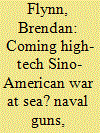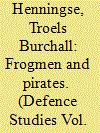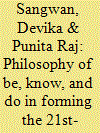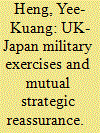|
|
|
Sort Order |
|
|
|
Items / Page
|
|
|
|
|
|
|
| Srl | Item |
| 1 |
ID:
179964


|
|
|
|
|
| Summary/Abstract |
In an era of cyber threats, drones and artificial intelligence, will the future of inter-state warfare at sea inevitably be high tech? This paper challenges assumptions about the ubiquity and importance of high technology in any future naval clash between China and America. While taken as a given that the most advanced weapons and platforms will be vital to such a conflict, both navies also employ legacy weapons and older technologies. A case study is offered here of medium calibre naval guns, seen on the very latest naval surface combatants of both China, the USA, and other major navies. Why do modern navies persist with such seemingly old weapons? To what extent are they likely to be important in any future conflict? It is argued that overly focusing on the latest high-tech weapons risks a type of naïve technological determinism and obscures how high- and low-tech weapons are often complementary. It is this synergy that requires greater understanding and attention. Moreover, relatively low-tech weapons like guns could be surprisingly relevant in the context of hybrid and amphibious warfare scenarios involving China and the USA, especially for the diplomacy of the “shot across the bows”.
|
|
|
|
|
|
|
|
|
|
|
|
|
|
|
|
| 2 |
ID:
179966


|
|
|
| 3 |
ID:
179963


|
|
|
|
|
| Summary/Abstract |
What role can special operations forces (SOF) play against for-profit, illicit networks in operations with strict rules of engagement? How can small states utilize their SOF units to add value to a military strategy in cases where they take an active role in multinational operations? Based on in-depth interviews with members of maritime SOF units, commanding officers, and archival research, this article unearths the roles that Danish and Dutch maritime SOF units played against Somali piracy networks. Specifically, it analyses how SOF units were able to evolve their tactics, which allowed the international naval task forces to target the piracy networks’ increasingly sophisticated operations. Moreover, the article discusses other potential ways SOF units can influence for-profit, illicit networks. The case study sheds light on an aspect of the utility of SOF often overlooked in the literature, namely the ability to use discriminate and proportional violence in operations that straddle the categories of peace and war. This almost mundane use of SOF units is of special interest in relation to small states, who may take on leadership roles if they are willing to engage in the development of the operational concepts.
|
|
|
|
|
|
|
|
|
|
|
|
|
|
|
|
| 4 |
ID:
179967


|
|
|
|
|
| Summary/Abstract |
21st-century military operational environment is characterised by changeability, uncertainty, complexity, and ambiguity. Hence, the military primarily aims to groom and develop essential competencies of the soldiers for success and survival. The purpose of this systematic review is to synthesise 21st-century military war-front competencies to connect to the philosophy of Be, Know, and Do to analyse what a soldier must Be, what a soldier must Know, and what a soldier must Do to successfully fulfil the responsibilities and assigned roles. This philosophy relates 21st-century military competencies to the best set of meta-competencies according to the functionality in the operational environment. The study identified 300 pieces of research and 15 military field manuals published in various journals and databases. For each research, purpose, corresponding competencies, and criteria were used to analyse competencies. This research aims at preparing a conceptual framework of 21st-century military war-front competencies.
|
|
|
|
|
|
|
|
|
|
|
|
|
|
|
|
| 5 |
ID:
179962


|
|
|
|
|
| Summary/Abstract |
The emergence of increasingly autonomous uninhabited systems has sparked understandable concern among policymakers, defence personnel, and academics, as well as civil-society. Quite reasonably, the body of literature that is arising in response to this concern has largely remained focused on the ethical, legal and practical consequences of “killer robots” being deployed by great power militaries. Unfortunately, however, this has left significant gaps in our understanding of how the diffusion of uninhabited systems and Artificial Intelligence will impact on security of rising middle powers and the lives of their citizens. This article provides an analysis of how the diffusion of uninhabited systems will influence the exercise of sub-national power, using Southeast Asia as its focal point. In other words, this paper asks the question of how autonomous weapon systems will influence the regimes of power and considers how the blurring of the lines between the law enforcement and military use of force paradigms affects law enforcement, border security, and internal surveillance and repression in this region.
|
|
|
|
|
|
|
|
|
|
|
|
|
|
|
|
| 6 |
ID:
179965


|
|
|
|
|
| Summary/Abstract |
The United Kingdom (UK) and Japan have conducted unprecedented military exercises as each other’s closest security partners in Asia and Europe, respectively. Despite publicly avowed closeness, these military exercises were not predicated on formal alliance commitments or deterrence of common adversaries underpinned by shared threat perceptions. Addressing this puzzle, a hitherto-overlooked perspective of mutual strategic reassurance for trusted partners is proposed here. This paper derives hypotheses from existing – but relatively under-developed – literatures on military exercises and reassurances that locate the drivers of reassurance in the needs and weaknesses of the other. What stems from this starting premise is an importance placed on high-level diplomacy and adjusting military deployments to allay each other’s strategic concerns. These hypotheses are tested by presenting original interview data supplemented with discourse analysis of both primary and secondary sources. The findings suggest that effusive diplomatic language vowing politico-strategic support for each other, reinforced by ground-breaking military exercises mutually reassured UK concerns about retaining post-Brexit global standing and Japan’s apprehension over its dire geo-strategic context. While not quite deterrence or alliance, these military exercises enabled the UK and Japan to transform their predominantly trade-based relationship into a more defence-oriented one.
|
|
|
|
|
|
|
|
|
|
|
|
|
|
|
|
|
|
|
|
|